It all started when Paul Maurice was fired. It's a theme common to coaching stories, the shift of coaches natural, inevitable, the marriages finally going sour and the teams and managements moving on.
Except at this point, Maurice wasn't a coach. He had never really thought of coaching, beyond, perhaps, in an offhand way when he was 18 and his schoolteacher father suggested it as a career path, in the way that parents sometimes do. As Maurice said, "I was so disgusted by the thought."
Until he got fired.
Paul Maurice still listening, learning with Jets
Winnipeg coach never expected to get NHL job but is approaching 600 wins
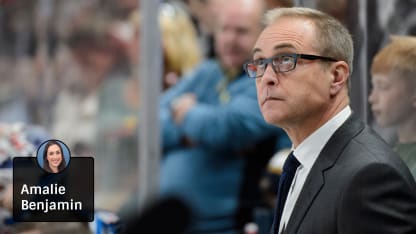
It was 1987, and Maurice was in his over-18 year with Windsor of the Ontario Hockey League, playing for now-Pittsburgh Penguins general manager Jim Rutherford and Carolina Hurricanes owner Peter Karmanos, and the St. Louis Blues opted to send down goaltender Pat Jablonski. The team already had two overage players and couldn't keep all three, per the rules. That meant Maurice, who had continued to play despite sustaining a damaging eye injury, had to go.
"I was captain of the team and they cut me at Christmas," said Maurice, now coach of the Winnipeg Jets. "They said to stick around and coach for half a year. I thought, you know what, I'm going to do it."
Why not?
He finished the 1987-88 season as an assistant coach with the Spitfires, turning 21 years old in the process. He didn't know what the future would hold; after all, this was never his plan. That is, until Karmanos approached him at the year-end banquet with a question: "Did you enjoy it?" he asked, as Maurice recalled. "Have you given any thought to what you want to do now?"
It was an easy question to answer, and that answer changed everything.
"'I love coaching,'" Maurice said he told Karmanos. "'I'd love to do it next year.' And he said to me, 'You can coach as long as you want.' That is in 1988. He basically employed me right to 2011 as a coach, other than a couple of hiatuses and firings. And that's how it started."
Even then, there was a fallback. Even then, Maurice wasn't entirely committed or didn't quite know how it would go. Because who could have predicted this?
"Mr. Karmanos had obviously started Compuware," Maurice said of the Detroit software company. "I'm a Canadian kid living in Windsor, I'd love to go work for that company. If I stay in coaching, you never know what's going to happen, maybe I can go to work at Compuware somewhere. That was the career plan."
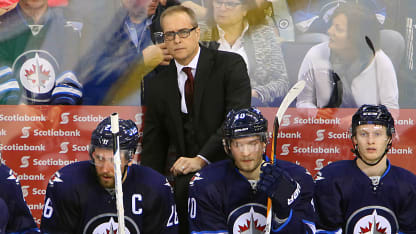
© Jonathan Kozub/Getty Images
He never needed it. He never left coaching. And as Maurice prepares to coach in the 2016 Tim Hortons NHL Heritage Classic against the Edmonton Oilers on Sunday (3 p.m. ET; NHLN, SN, TVA Sports 2, NHL.TV), he has 558 NHL wins, having become the second-youngest to 500, behind only Scotty Bowman, on Jan. 13, 2015.
He was 47 years, 348 days old that day. It was his 17th season as an NHL coach.
But Maurice almost didn't make it that far. He almost didn't get that chance. He had become the coach of the Detroit Jr. Red Wings in 1993-94, had gotten to the Memorial Cup Final (and lost) the next season. His team was young. He had a future. And then Rutherford called.
"Jim Rutherford said, 'I want you to come to Hartford to be an assistant coach,' and it was not on my list of things I wanted to do," Maurice said, chuckling. "I was coach and general manager, I was 27 years old, it was good. I was getting married. Life was good."
He didn't want to go. But he couldn't say no to a friend, so he became an assistant with the Hartford Whalers to start the 1995-96 season.
"It was clearly over my head," Maurice said. "But [Rutherford] was a very persistent young man at the time. He gets what he wants. And that's not even a fair statement. He knew instantly it was the right thing to do and it turned out he was right, as [with] almost everything he ever said to me."
And then Rutherford and the Whalers fired coach Paul Holmgren 12 games into the season. They hired Maurice, who coached his first NHL game with the Whalers on Nov. 7, 1995. He was 28 years old, the second-youngest coach in NHL history. Four of his players were older than he was. Five more were mere months younger.
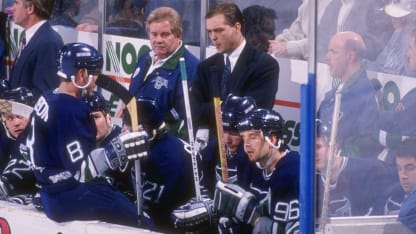
© Rick Stewart
"When I look back at it now, I knew at the time that I wasn't ready for it," Maurice said. "But it was probably a good driver for me, because it made you want to watch every game and learn all you could, and then you get into that rhythm and you probably never come out of it. So you're always looking for what's next, what's best, best practices. I've watched an awful lot of hockey, and you always feel like there's another place to go, there's a better way to learn, a better way to teach.
"My knowing that I was really working hard to tread water those first few years has helped me."
It is perhaps foolhardy to ask the what-ifs. What if Maurice hadn't taken that job? What if he had waited? Where would he be? What would he be doing? The questions are, usually, impossible to answer. But there is something, or, rather, someone, who is instructive: San Jose Sharks coach Peter DeBoer.
The two have known each other since they were teenagers, since they played together on the Spitfires when Maurice was 17 and DeBoer 16. DeBoer was there when Maurice injured his eye, was there when he was fired, was there when he started coaching, was there as an assistant to Maurice with the Detroit Jr. Red Wings. That was when they parted ways; Maurice jumped to the NHL with the Whalers, who would become the Carolina Hurricanes while he was coach, and DeBoer remained in the OHL.
It would take 13 more seasons before they reunited in the NHL. It came in 2008-09, when DeBoer got a shot to coach the Florida Panthers and Maurice was re-hired by the Hurricanes.
Would it all have been different if he had waited? If Maurice had taken the time to ripen in the minors, the way DeBoer did?
"That's a great question that I don't allow myself to think," Maurice said. "Because it wasn't easy early on for me and it took me a long time to really kind of enjoy working in the NHL, because I always felt like I was chasing."
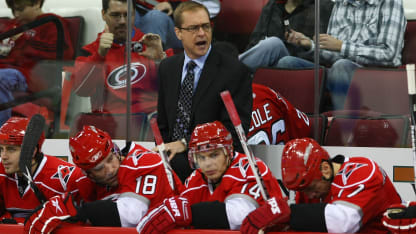
© Bruce Bennett/Getty Images
Still, perhaps Maurice didn't need the seasoning, even if he struggled and doubted and looked up at everyone else at first. Even if it weren't easy. This was where he was supposed to be, whether he had wanted to be there initially or not.
"I really believe he's a special coach, and was at a very young age," DeBoer said. "I needed the 12-13 years of junior hockey and I coached my first NHL team when I was 40, and still wasn't sure if I felt ready. The fact that he was coaching an NHL team at [28] years old is unbelievable, and I think he doesn't get enough credit, that [it] doesn't get talked about enough. It's an amazing feat.
"There's only a handful of guys I know that you could stick behind a bench at [28] and they could survive and still carve out a career. That shows you how special his communication skills are, how big of a presence he is in a dressing room."
Because, as DeBoer pointed out, "There's nowhere to hide. These guys see right through you and recognize very quickly whether you deserve their respect and have it, or you don't."
He had their respect. He had the respect of Rutherford, too, as well as Karmanos. They had hired him in the first place, had stuck with him through losing seasons in his first three years with the Hartford/Carolina franchise. They had believed in him, because of what they saw and what they knew to be true.
"Any other guy's getting fired," Maurice said. "No other coach survives. ... And then I'm done - if I get fired in those first two years, where am I going? Am I going back to junior again? And if I'm there, I'm there for 10, 12, 15 [years], you never know.
"They stuck with me far longer than I think anybody else could have expected to have that support. That kind of support is the single critical piece to my being here. By far."
Maurice's career is an exercise in taking chances, in seizing moments. It is a reflection upon the value of experiences, whether that was in a second go-round with a team (two separate stints with the Hurricanes), in the Kontinental Hockey League with Metallurg Magnitogorsk or with Team Europe as an assistant at the World Cup of Hockey 2016, an experience to which Maurice immediately said yes, on the first phone call.
He collects them, values them, learns from them. That includes soaking up bits of wisdom, hockey and otherwise, from Team Europe coach Ralph Krueger at the World Cup. As Maurice said then, "I told him, hey, I'm stealing that, I'm stealing that. There's some thievery going on."
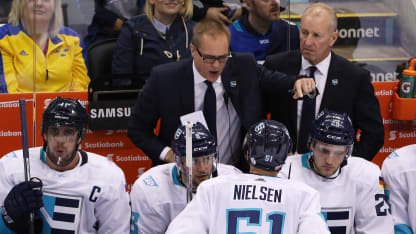
© Chris Tanouye/Getty Images
"What I think is unbelievable about [Maurice] is after all those years of National Hockey League coaching and coaching in general, he still, every single day, wants to learn something new," Krueger said. "For a guy who's coached that long, how much he feels what he now needs and not what was 10 years ago or 15 or 20. I think that's an unbelievable strength as a coach to be able to, after so many years, still be open to other opinions, flexible, and just to want to learn.
"Paul just wants to grow and learn every day. He's a student, absolutely still a student of the game even though he's an unbelievable teacher, and that combination is rare."
That has come over time as he has learned to listen, learned to learn. He knows now that one man working hard, as hard as he can, can get only so far. But when that man hears those around him? When he really takes in and uses what they're saying?
When he can have those moments, and improve from them?
"I don't feel a whole lot different than I did when I was 15, kind of wide-eyed about the whole thing," Maurice said. "My wife says some people collect mementos and I collect experiences. … I think as I get older I'm more interested in the small moments of life than I was yesterday, 10 years ago. The smaller connections.
"That sounds very strange, doesn't it? But it's the truth. That's the truth. So hockey for me, that's what it is for me now, all of that. The people in the room, the fans in Winnipeg, their interaction with the team, the effect the climate has on everything here in a positive way. There's just a lot of really interesting things in a life in hockey."
And it's a life that has so much more hockey in it, contrary to his initial belief, contrary to his musings on a career at Compuware. Because even with nearly 600 wins, Maurice does not turn 50 until January. There is time for more -- more hockey, more experiences, more wins.
"I think people are going to look back when he does walk away, and I think he's still got a long road ahead of him, I think the number of years and the number of games that he will have coached I think will catch a lot of people by surprise, when you look at the career he's carved out," DeBoer said.
Perhaps no one more so than Maurice, who never quite planned on this, on any of this.

















